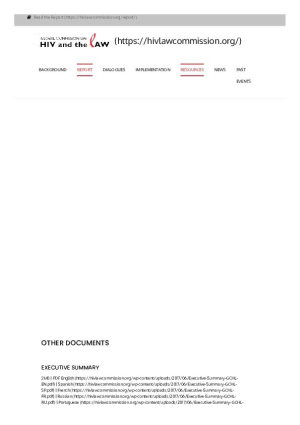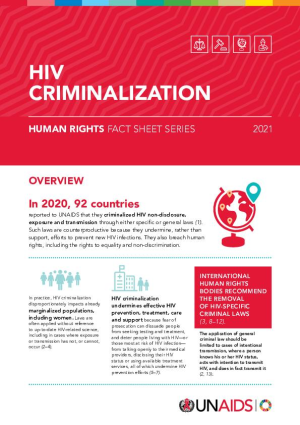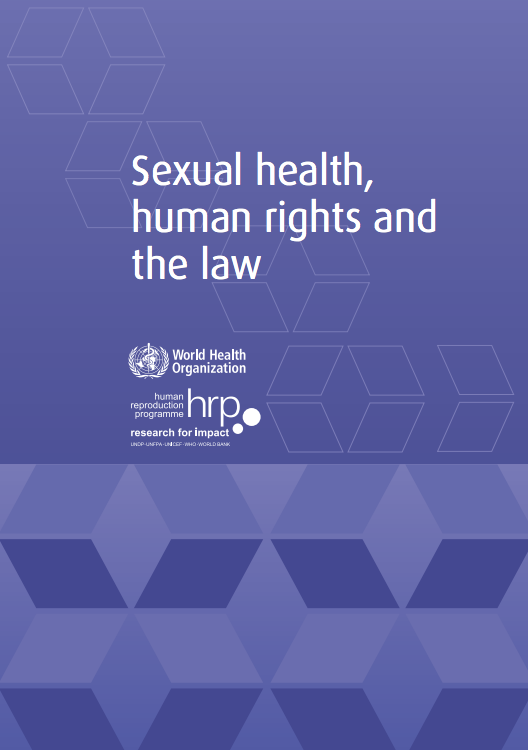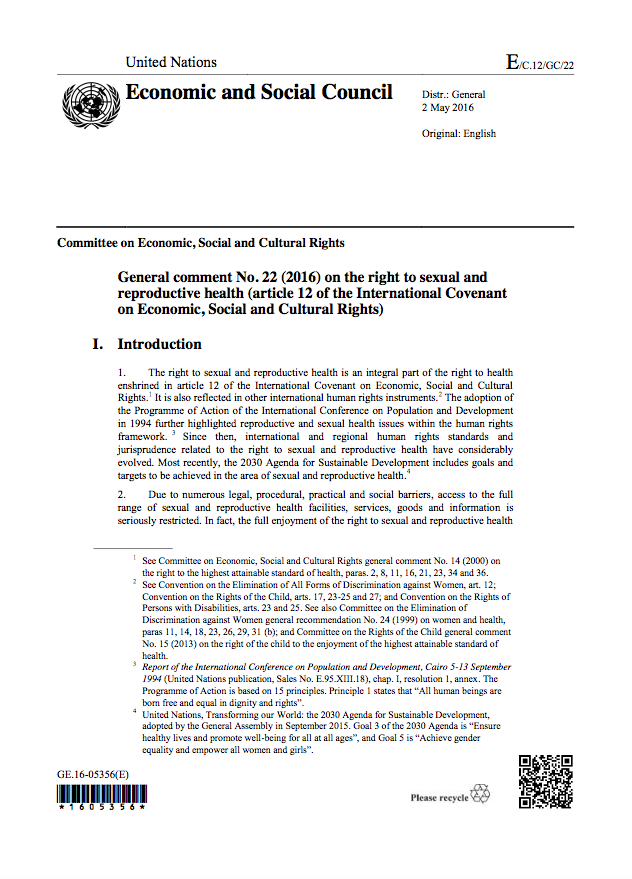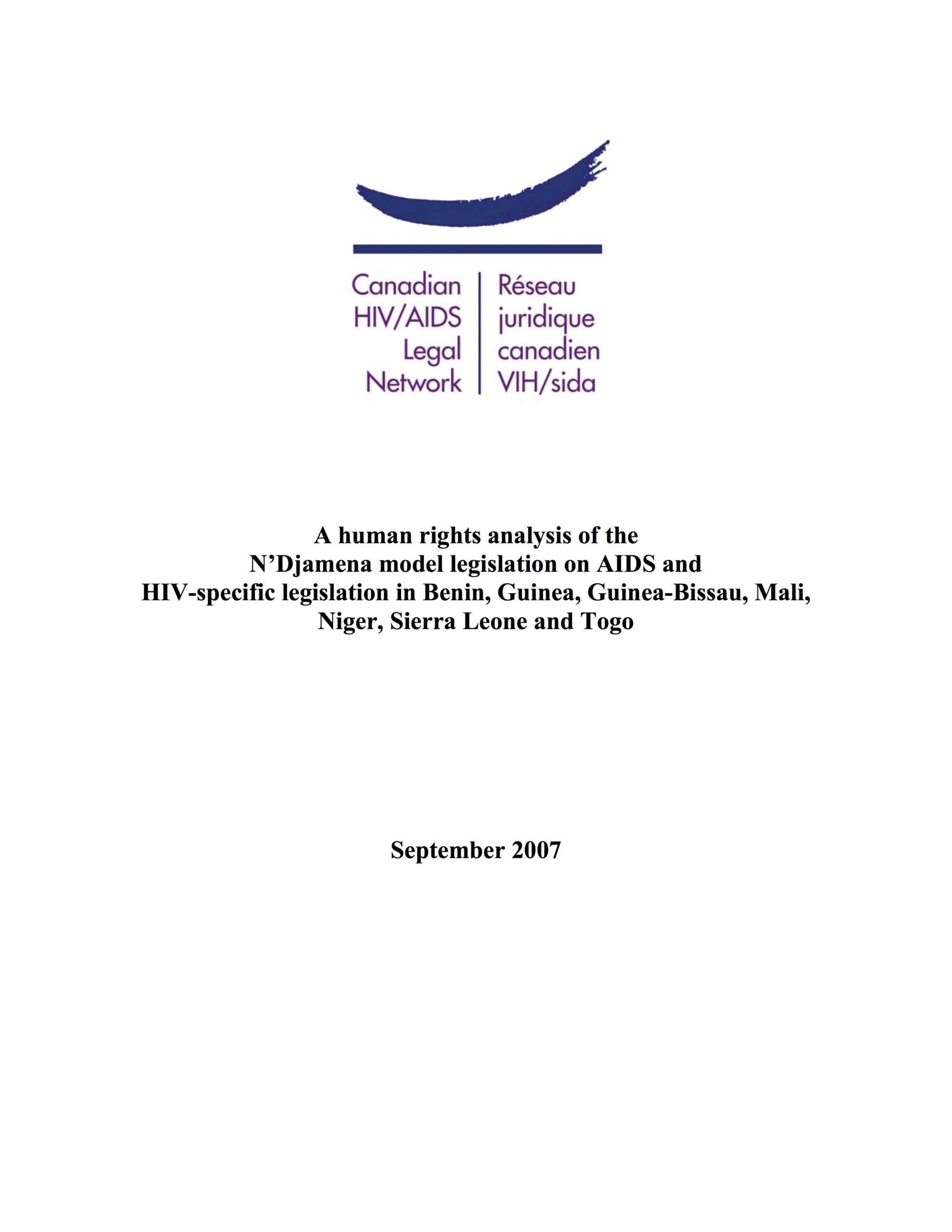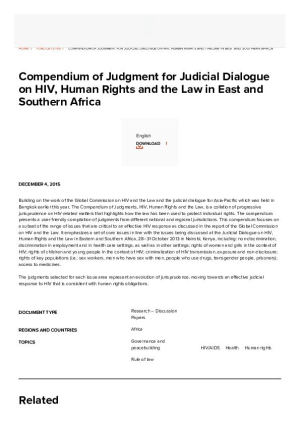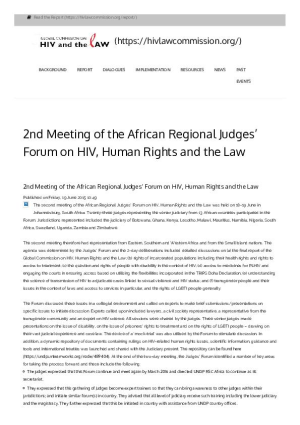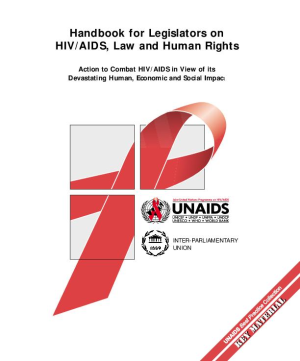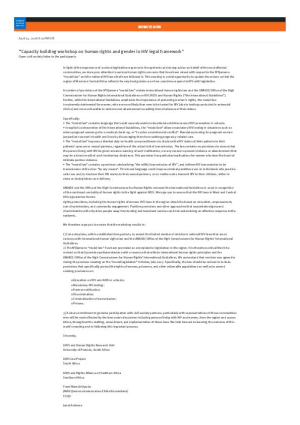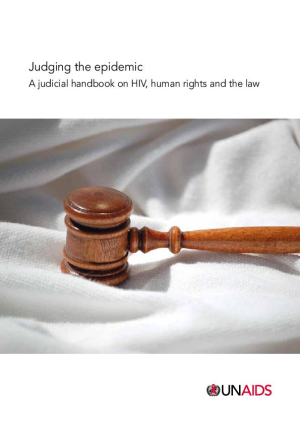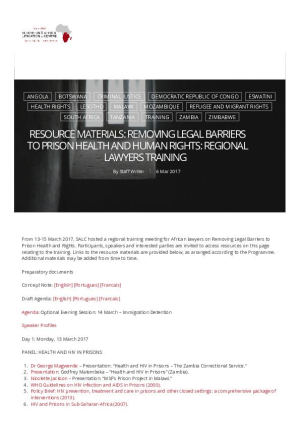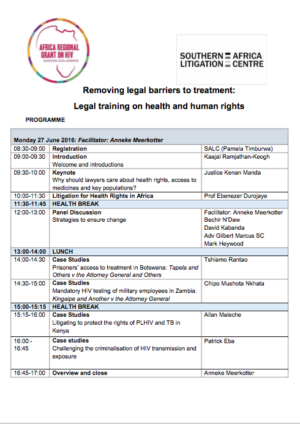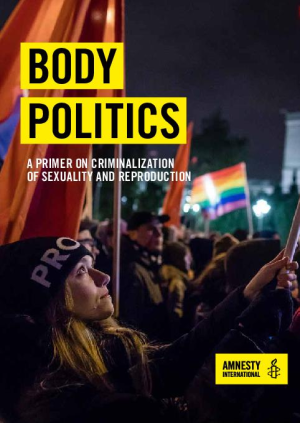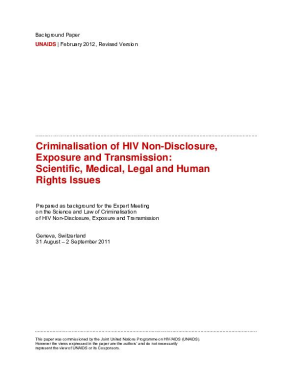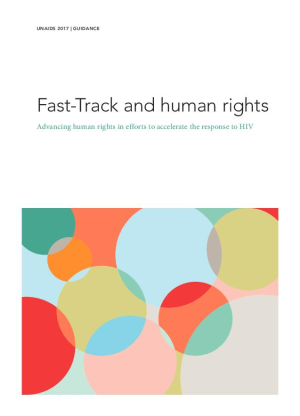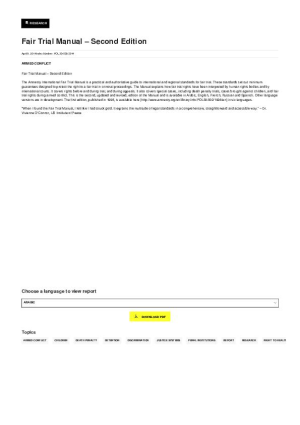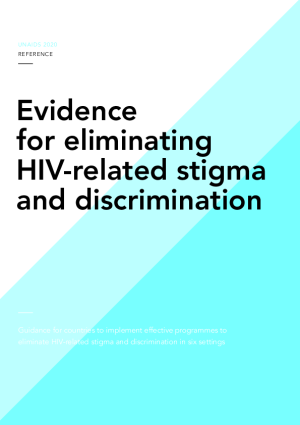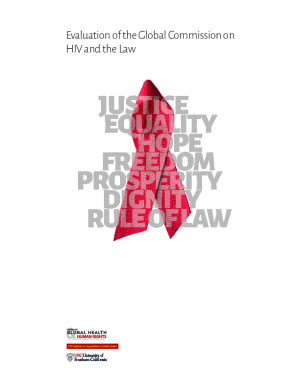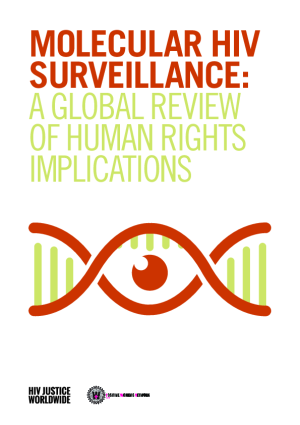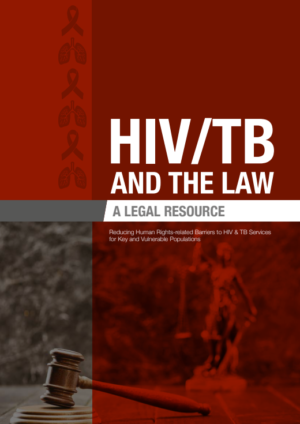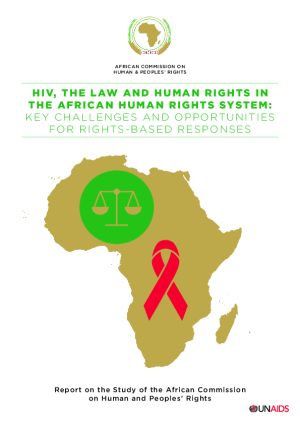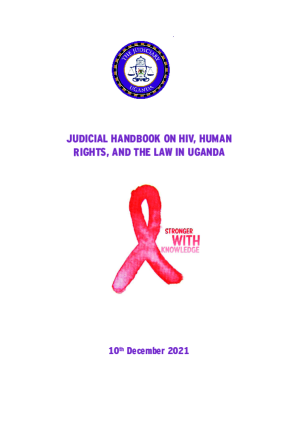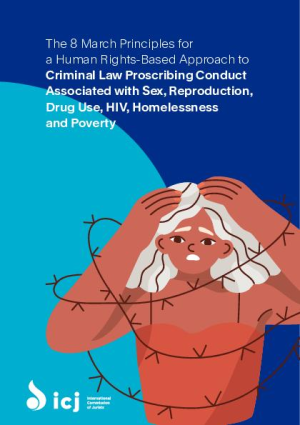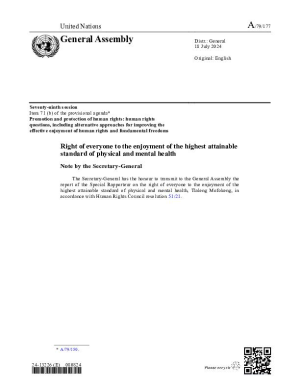Presents coherent and compelling evidence base on human rights and legal issues relating to HIV, including commentary and recommendations. Chapter 2 (pages 21-25) covers HIV criminalisation.
HIV Criminalisation as a Human Rights issue
Documents in this section address HIV criminalisation as a fundamental human rights issue and highlight the need for reforms to align laws and policies with international human rights standards.
HIV Criminalization – Human Rights Fact sheet Series
Series of fact sheets on human rights highlighting the critical need to scale up action on rights. Short, easy to digest and accessible document outlining the latest epidemiology, the evidence of the impact of human rights interventions, the latest targets, and international guidelines, recommendations and human rights obligations.
Other factsheets in the same series released in June 2021 include: HIV and people who use drugs, HIV and gay men and who have sex with other men, HIV and transgender and other gender-diverse people, HIV and sex work, HIV and people in prisons and other closed settings and HIV and stigma and discrimination.
Sexual health, human rights and the law
Considers States’ obligations to bring laws and regulations affecting sexual health into alignment with human rights laws and standards. Includes recommendations on HIV criminalisation.
General Comment No. 22 (2016) on the Right to sexual and reproductive health (article 12 of the International Covenant on Economic, Social and Cultural Rights).
Includes comment (at page 40) that States must reform laws that impede the exercise of the right to sexual and reproductive health. Examples include laws criminalizing non-disclosure of HIV status, and exposure to and transmission of HIV.
- Alternative links
- Spanish / Español, Russian / Русский
Report of the Special Rapporteur on the right of everyone to the enjoyment of the highest attainable standard of physical and mental health
Commentary includes clear statements outlining many ways that criminalisation undermines effective HIV response.
A human rights analysis of the N’Djamena model legislation on AIDS and HIV-specific legislation in Benin, Guinea, Guinea-Bissau, Mali, Niger, Sierra Leone and Togo.
Detailed information and analyses of HIV-specific legislation in seven Central and West African countries from a human rights perspective. Provides commentary on N’Djamena model legislation on HIV/AIDS (2004).
HIV-specific legislation in sub-Saharan Africa: A comprehensive human rights analysis
Analyses key provisions in HIV-specific laws, outlining both protective and punitive provisions including criminalisation of HIV non-disclosure, exposure and transmission. Argues these provisions are generally overly broad, disregarding the best available recommendations for legislating on HIV; failing the human rights test of necessity, proportionality and reasonableness; consecrating myths and prejudice; and undermining HIV responses.
The Compendium of Judgments, HIV, Human Rights and the Law
Includes judgements from jurisdictions around the world, representing enabling jurisprudence on HIV-related issues, including judgements related to the criminalization of HIV transmission, exposure and non-disclosure.
2nd Meeting of the African Regional Judges’ Forum on HIV, Human Rights and the Law, 2015
Describes the second meeting of the African Regional Judges' Forum on HIV, Human Rights and the Law was held in Johannesburg, South Africa.
Report on the ARASA/OSISA civil society consultative meeting on the criminalization of the wilful transmission of HIV
Outlines discussions at a community consultative meeting on HIV criminalisation attended by members of civil society from a range of countries within the Southern African Development Community (SADC). The meeting considered different perspectives on criminalisation, aiming to reach consensus on what constitutes an appropriate and effective response to harmful HIV-related behaviour.
UNAIDS Handbook for Legislators on HIV/AIDS, Law and Human Rights
Aims to assist parliamentarians and other elected officials to undertake appropriate law reform and develop effective legislation to fight against AIDS. Provides examples of best legislative and regulatory practices from around the world. (This resource contains content that is broader than HIV criminalisation.)
- Alternative links
- French / Français
Open civil society letter to the participants of the “Capacity building workshop on human rights and gender in HIV legal frameworks”
Raises serious human rights concerns about the N’Djamena “model law” and the national HIV laws that have followed it. Urges development of guidance on how countries should use legislation to respond to HIV.
Legal Reforms, Social Change: HIV/AIDS, Human Rights and National Development in Jamaica
Designed to help governments and civil society review laws and policies based on human rights, and increase capacity to achieve enabling legal environments. Includes recommendations on criminalisation at p.73.
Judging the epidemic: A judicial handbook on HIV, human rights and the law
Prepared as a resource to help judges, magistrates, arbitrators and other judicial officers throughout the world adjudicate cases involving HIV-related issues. Based on international legal and human rights standards, the handbook contains examples of decided cases from different jurisdictions, good-practice advice and judicial rulings on HIV-related issues.
Removing Legal Barriers to Prison Health and Human Rights: Legal Training for African Lawyers
Between 13-15 March 2017, SALC hosted a regional training meeting for African lawyers on Removing Legal Barriers to Prison Health and Rights. A huge amount of resources relating to the training are contained here. Links to the resource materials are provided, as arranged according to the Programme. Additional materials may be added from time to time.
Removing legal barriers to treatment: Legal training on health and human rights
On 27-29 June 2016, the Southern Africa Litigation Centre (SALC) hosted a regional training meeting for African lawyers on “Removing legal barriers to treatment: Legal training on health and human rights” in Johannesburg, South Africa. A large amount of resources relating to the training can be found here, including judgements relating to HIV criminalisation in Africa.
Body Politics: A Primer on Criminalization of Sexuality and Reproduction
Details the major areas of concern and the harm which both direct and indirect criminalization inflict on an individual’s human rights and the health of society as a whole.
Criminalisation of HIV Non-Disclosure, Exposure and Transmission: Scientific, Medical, Legal and Human Rights Issues
This paper was commissioned by the UNAIDS Secretariat to serve as a background paper for the Expert Meeting on Criminalisation of HIV Non-Disclosure, Exposure and Transmission, 31 August – 2 September 2011, Geneva, Switzerland. It synthesises general considerations concerning issues raised by the application of the criminal law to non-disclosure, exposure or transmission in relation to HIV Scientific, Medical, Legal and Human Rights Issues.
Fast Track and Human Rights – Advancing human rights in efforts to accelerate the response to HIV
Spells out for the first time (on p23) that there must be “Non-criminalization of mother-to-child transmission” when a country applies for validation for the elimination of mother-to-child transmission of HIV. This marks the first time in public health history that human rights guarantees are considered a prerequisite to validating disease elimination.
Fair Trial Manual – Second Edition
This Manual seeks to provide a practical guide to the relevant human rights standards for anyone involved in examining how well a criminal trial or a justice system meets international standards of fairness. It is intended for the use of trial observers and others assessing the fairness of an individual case, as well as for anyone seeking to evaluate the extent to which a country’s criminal justice system guarantees respect for international standards of fair trial. It may also serve as a guide for law makers, judges, prosecutors and defence lawyers or as a training tool.
Evidence for eliminating HIV-related stigma and discrimination – Guidance for countries to implement effective programmes to eliminate HIV-related stigma and discrimination in six settings
This report reviews the latest evidence on what works to reduce HIV-related stigma and discrimination through key programmes to reduce stigma and discrimination and increase access to justice in the six settings of focus for the Global Partnership, including Justice. It includes guidance and recommendations for national governments and key stakeholders to implement programmes to empower populations “being left behind”; remove laws criminalising drug use or possession for personal use, all aspects of sex work, sexual orientation, gender identity, and HIV exposure, non-disclosure and transmission and to routinely review existing laws, regulations and policies relating to HIV.
- Alternative links
- Portuguese, French, Spanish, Russian
Evaluation of the Global Commission on HIV and the Law
Findings from an external evaluation of the impacts and legacy of the Global Commission on HIV and the Law. It explores the fulfilment of the Commission’s objectives, taking into account the perspectives and experiences of representatives from government, including law and policy makers, civil society including those most marginalised and affected by HIV, as well as United Nations agencies and other development partners.
Molecular HIV Surveillance: A global review of human rights implications
Provides a detailed explanation of what MHS is and how it is used across the globe, including how the technology works, where it is being conducted, and by whom. The paper describes growing human rights concerns relating to the use of this technology and goes on to list a number of recommendations for the use of MHS which were gathered from an international literature review and from members of an Expert Advisory Group.
Reducing Human Rights Related Barriers to HIV & TB Services for Key and Vulnerable Populations: Legal Support Resource
The legal support resource is part of an on -going human rights programme with the goal of reaching key and vulnerable populations by utilising customised and targeted interventions. These interventions include activities on (1) legal empowerment;(2) training of paralegals on issues related to HIV, TB and human rights; (3) legal and paralegal support to community members whose human rights have been violated including pursuing identified matters to court; and (4) sensitisation of judiciary, law makers and traditional leadership especially those involved in traditional courts.
It gives practical information on current and evolving legislation, common law and policies pertaining to HIV and TB in South Africa. The aim is to educate, sensitise and provide updated information to paralegal and legal practitioners alike, who are engaged in offering legal advice and services to individuals and communities who serve members of the vulnerable and key populations.
General Comments No.1 on Article 14 (1) (d) and (e) of the Protocol to the African Charter on Human and Peoples’ Rights on the Rights of Women in Africa
The Protocol to the African Charter on Human and Peoples’ Rights on the Rights of Women in Africa (the Maputo Protocol) is the first international legally binding human rights instrument to recognize the intersection between women’s human rights and HIV. In Article 14 (1) (d) and (e), the Maputo Protocol lays down women’s right to self-protection and to be protected from HIV infection, as well as their right to be informed of their HIV status and the HIV status of their partners in accordance with international standards and practices in force. As such, the Maputo Protocol is therefore, in practice, an important tool towards the alleviation of the disproportionate effect of the HIV pandemic on the lives of women in Africa. Even though considered as a landmark, the provisions of the Maputo Protocol on HIV are not very explicit on the measures to be taken by States Parties to ensure the full implementation of women’s rights to sexual and reproductive health. In order to meet this objective, the African Commission on Human and Peoples’ Rights (the Commission) adopted these General Comments on Article 14 (1) (d) and (e) at its 52nd Ordinary Session held from 9 to 22 October 2012 in Yamoussoukro, Côte d’Ivoire.
HIV, the Law and Human Rights in the African Human Rights System: Key Challenges and Opportunities for Rights-Based Responses
Report on the Study of the African Commission on Human and Peoples’ Rights. The report presents the current state of the HIV epidemic in Africa through a human rights and gender lens by showing the populations and locations most affected by HIV and those underserved by the response to the epidemic. It also describes the global, regional and national norms and standards relating to HIV and health, as well as their interpretation and application by African regional mechanisms, United Nations (UN) bodies and national courts and institutions. It further provides a detailed analysis of the key human rights challenges affecting the response to HIV on the continent.
- Alternative links
- Français
Judicial Handbook on HIV, Human Rights and the Law in Uganda
The Judicial Handbook on HIV, Human Rights and the Law in Uganda comprises of five parts that address the issues relating to HIV/AIDS and raises pertinent issues relating to its existence as may affect Judges’ decisions as well as possible recommendations for a start. Specifically, it has a background in which the current status of the HIV/AIDS epidemic and response to it is included.
- Part I enunciates the International Law and Human Rights Frameworks as applicable to HIV/AIDS in Uganda
- Part II concentrates on the National Law and Human Rights Frameworks as applicable to HIV in Uganda.
- Part III is about gaps/issues/shortfalls in national law and human rights frameworks as applicable to HIV and discusses policies on HIV.
- Part IV pertains to criminalization of transmission of HIV and its adverse effects.
- Part V is about things to remember when judging and adjudicating HIV cases, what the disposition of a judicial officer should be as well as the role of a judicial officer in the courtroom whilst handling such cases.
Implementing and scaling up programmes to remove human rights related barriers to HIV services
This publication builds on existing global technical guidance in human rights responses, and further advances efforts to support implementers to design and deliver high quality human rights programmes that are well integrated, sustainable, and at scale. The guidance is practical and organised around the Investment Approach to HIV. It helps implementers to understand the programmatic components of evidence-informed and quality interventions to remove barriers to services.
8 March Principles for a Human Rights-Based Approach to Criminal Law Proscribing Conduct Associated with Sex, Reproduction, Drug Use, HIV, Homelessness and Poverty
The Principles, published by the International Commission of Jurists are based on general principles of criminal law and international human rights law and standards. They seek to offer a clear, accessible and workable legal framework – as well as practical legal guidance – on applying the criminal law to conduct associated with: sexual and reproductive health and rights, consensual sexual activities, gender identity and expression, HIV non-disclosure, exposure or transmission, drug use and homelessness and poverty. The principles are additionally intended to address the detrimental impact of the criminalization of this conduct on health, equality and other human rights.
Decriminalisation and the end of AIDS: keep the promise, follow the science, and fulfill human rights
A statement from the UNAIDS Reference Group on HIV and Human Rights stating that criminal laws violate a variety of human rights, including the rights to the highest attainable standard of physical and mental health, non-discrimination, privacy, autonomy, dignity, freedom of expression, freedom from arbitrary detention, and ultimately the right to life, among others and calls for States to take proactive measures to end such practices and abolish the underlying criminalisation.
Stakeholder views on the relationship between human rights and the law in addressing the HIV epidemic in Papua New Guinea
This article draws on a qualitative study conducted in Papua New Guinea (PNG) which examined stakeholder views on prospects for law reform, the impact of criminal laws on communities, and the role of law reform in addressing the HIV epidemic. While efforts to reform criminal laws related to sex work and male-to-male sex have taken place in PNG, these have been unsuccessful. Stakeholders identified that strategies for addressing criminal laws and the impacts of law reform must be grounded in the PNG context, that there must be material support for community members to engage with criminal laws and human rights, and that dignity rather than HIV should be the justification for law reform.
Right of everyone to the enjoyment of the highest attainable standard of physical and mental health
In her report to the General Assembly, Dr. Tlaleng Mofokeng, the Special Rapporteur on the right to health, explored the model of harm reduction as applicable to cases of drug use, HIV exposure, transmission and non-disclosure, abortion, same-sex relations, and sex work. She highlighted populations that are often stigmatised, criminalised and discriminated against to the detriment of their enjoyment of human rights and urged States to “divest from punitive approaches, move away from criminalisation and employ regulatory tools to improve health outcomes.”

